New to Fusion 360? Here are 10 tips to help you easily get started. We’ll focus on the basics of design and 3D CAD.
Well hello, and congrats on getting started with Fusion 360! It’s a wide world of opportunity out there, and chances are, you might be a bit overwhelmed at the beginning. Here are my top 10 tips for total beginners when it comes to CAD, design, and Fusion 360!
Getting Started – Fusion 360
1. DON’T PANIC
It’s ok, starting out can be daunting. Thankfully we’ve got your back, so just take a deep breath, put on a brew, and let’s take things slowly.
If you’re just starting out, or even if you’re familiar with other CAD packages, I always recommend starting with the learning content! We use both Youtube and our own official learning portal to get started.
The YouTube channel is full of great tutorials, quick tips, and videos on how to use Fusion 360.
If YouTube isn’t for you, and you prefer a more structured way of learning, the learning portal is your best bet. It’s laid out in a simple way for you to get started. Then broken down into various categories so you can prioritize the content that is most important to you! You can find it here.
2. Seriously, DON’T PANIC
One of the most common things I see beginners do is freak out if they click on the wrong thing. Fusion 360 however, has a bunch of neat tricks for when you make errors.
When working with tools in the create or modify menus, you’ll see next to the various inputs, an X.
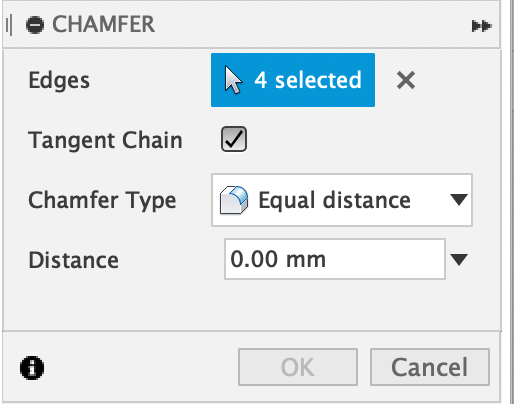
Let’s say you select the wrong things you want to chamfer, instead of hitting cancel or escape, just hit X. It will wipe what you’ve selected and let you reselect what you want! You can also hold down the command (on a mac) or ctrl (on a PC) and manually deselect the individual parts that you don’t want in the operation!
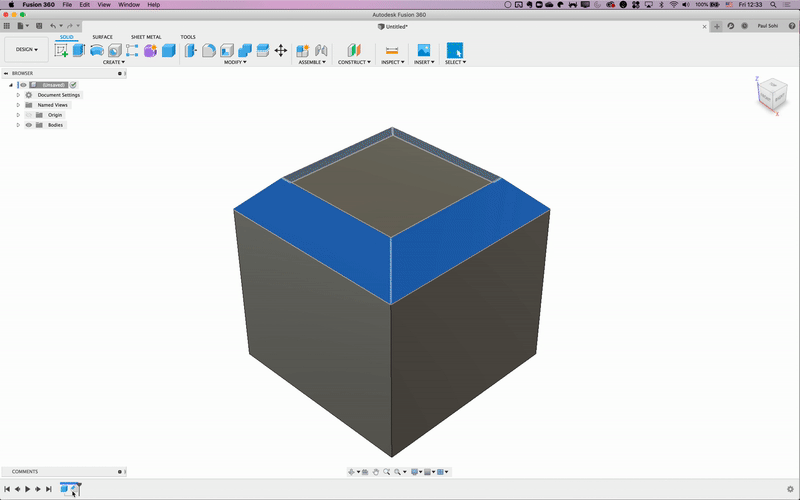
Well, what about if you do the operation, and hit enter? Don’t worry we’ve got you covered on that too! Let’s stick with the chamfer for now. You don’t need to hit undo, in the timeline you can just double-click on the particular operation and it will open up that operation, and you can hit the X, or use the ctrl/CMD as before!
3. Sketch Basics
One of the most common errors I see total beginners making has to do with sketches. When using the sketch tool, every now and again new users might accidentally hit Stop Sketch at the end of the toolbar, or in the tool palette, panic, and then go to sketch — create a sketch. This, however, doesn’t take you back to the same sketch, it’s like starting a drawing, stepping away, and then laying another sheet of paper on top of the other to finish the drawing off. They might look like they line up, but they aren’t the same drawing, it’s the same thing with Fusion 360, if you start a sketch, stop, and create a new one, Fusion 360 won’t connect those lines, even if they look connected.
So, as before, if you accidentally stop a sketch, just double-click on it in the timeline to jump back to it!
4. Speaking of sketches, get a pencil and some paper
Look, CAD is amazing, but all ideas start in your head. No matter how good you are, no matter how many years of experience, always start ideas using a pencil and some paper. If you’re feeling like tech is the only way, try out Autodesk Sketchbook but always start your ideas as a sketch, it’s faster than building it out in CAD.
You don’t need to be amazing at drawing, just get your idea out of your head onto paper first and work from there, it’ll help you flesh it out, and identify problems faster than going straight into 3D modeling!
5. Start Simple
Learning a new tool can be a daunting task, but it’s only as hard as you make it. Maybe your end goal is to start up a driverless car company, or something equally epic, but if you’re starting out with CAD, don’t try and dive right in and work on that final product. Take it easy, slow and steady wins the race! Start with small individual single-part projects first, and introduce more and more complex as you go along. You can’t run until you know how to walk!
6. The mysteries of the right click
When you start out with Fusion 360, you can do basically all your basic functions with just the left click on your mouse, but did you know there’s a stack of stuff the right click can do too? My personal favorite use of the right click is the wheel that surrounds where you clicked. At the top of that wheel, you’ll notice that the last function you used is always there, it’s a great time-saving function!
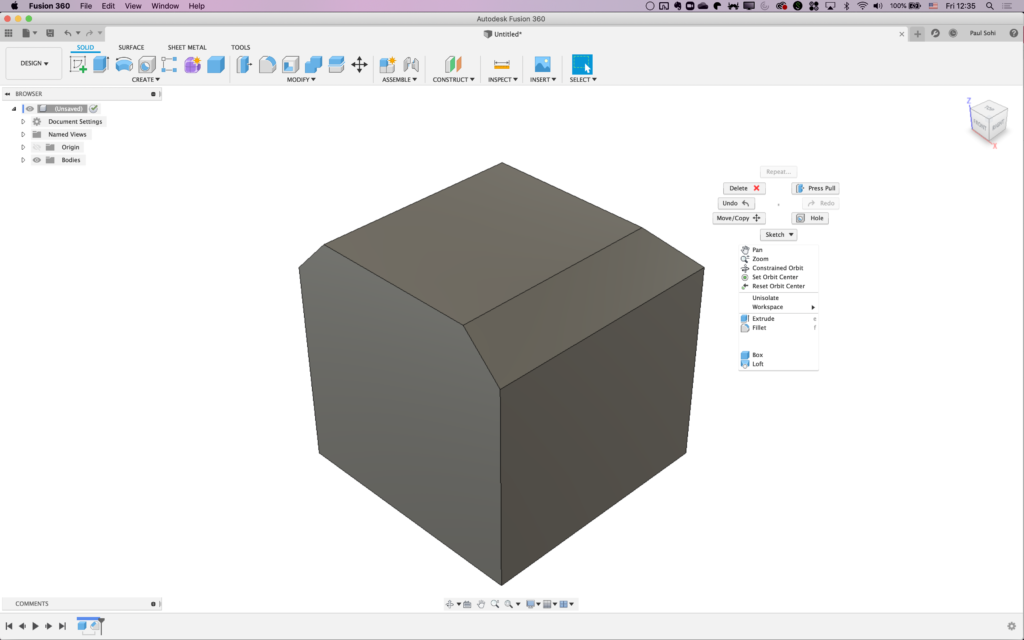
7. Speaking of clicks, get a 3 button mouse
All CAD tools require some basic functionality of the mouse. The left click executes stuff, the right click is for sub-menus, and the middle mouse button controls pan, zoom, and sometimes orbit. Trying to do this all with a trackpad is like trying to do a detailed drawing with a lump of coal, you’re gonna have a bad time. You don’t need to spend crazy money, even a basic $5 mouse will do the trick, just don’t use a trackpad!
8. Welcome to time-travel, with the parametric timeline
One of the biggest differentiators, and strongest tools, of Fusion 360 is the parametric timeline that allows you to jump back in time on a design and make changes that will cascade down to all other functionalities after that step.
In essence what this means, is that rather than just dumping new data on top of what you’ve done already, you can go back in time on your project to the point you want to make a change, and quickly amend it. If you ever speak to a designer, you’ll probably hear them say client’s micro-managing or minor amendments to designs can be one of the most time-consuming parts of the job. Not anymore thanks to Fusion 360!
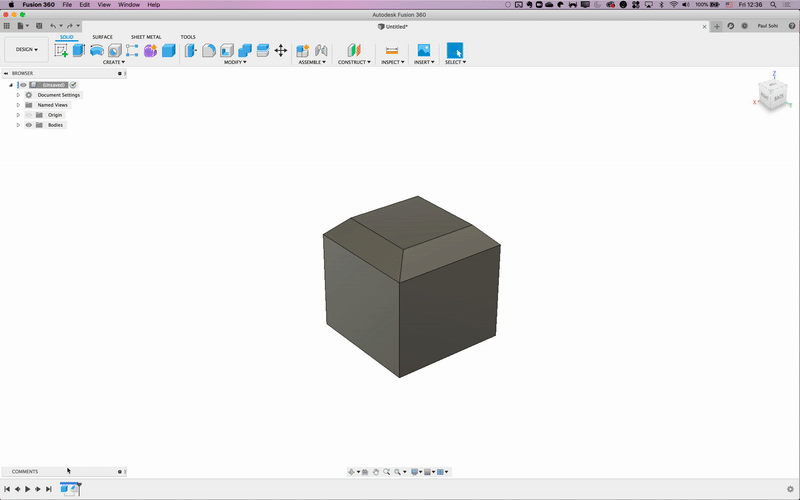
9. Use projects to manage data and collaborators
Fusion 360 stores all your data in the cloud, freeing up your hard drive for that collection of dank memes you keep. Wait you don’t keep an archive of dank memes? Well, now you can!
The projects you create within Fusion 360 act as ways to organize your data. Each project allows you to control who you collaborate with. Down the line, this can be really useful as you pull more and more people into work with!
10. The navigation cube is your friend
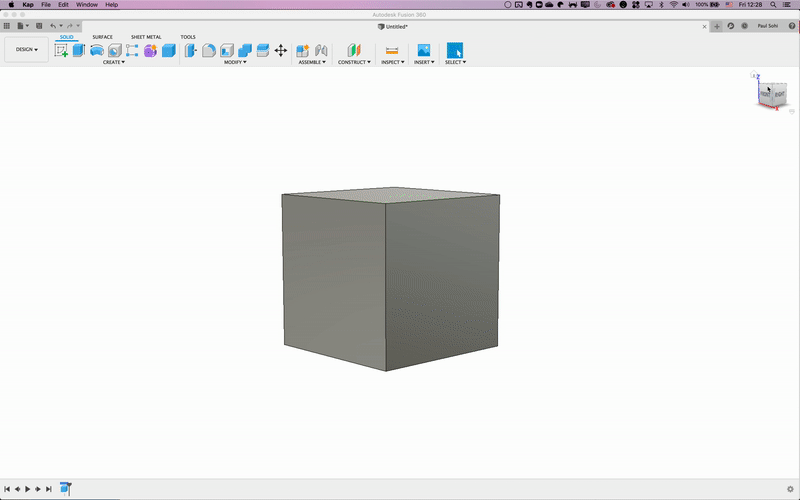
In the top right corner of Fusion 360, you’ll notice a little cube. This lets you understand your orientation against the x,y,z planes. It also lets you click on faces for orthogonal views, and finally, if you ever get lost, bring everything back into view with the home button.
This will be one of the most commonly used tools in your arsenal. It’s really important you learn how to use it most effectively because frankly, it’s the best thing in CAD ever. The navigation cube is one of those tools that does its job so well. You’ll forget how dependent you can be on it!
Getting Started – Fusion 360
And that’s it! Those are my top 10 tips for getting started in Fusion 360! Get started today with a 30-day free trial.
